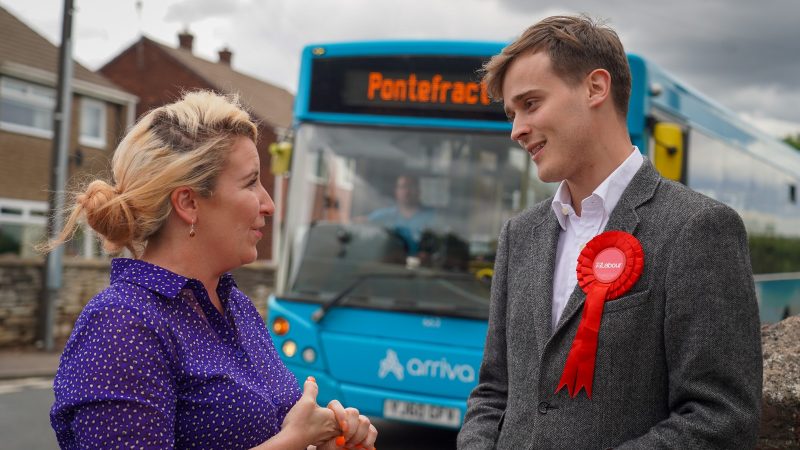
Last Thursday’s by-election in Selby and Ainsty, where Labour overturned a majority of over 20,000, was an utterly devastating defeat for the Conservatives, following the loss of Somerton and Froome to the Liberal Democrats earlier in the night.
Rishi Sunak’s response was to dash down the motorway to Uxbridge and South Ruislip, which the Tories unexpectedly held onto. While that result rescued him from the ignominy of being only the second Prime Minister to lose three by-elections at the same time, underneath the smiles and handshakes with local activists, he must have had a horrible feeling in the pit of his stomach. The Uxbridge by-election was an aberration. The result in Selby points to a potential wipe out of his party in the next general election.
The winning Tory candidate in the West London seat was good enough to confirm this. Steve Tuckwell attributed his success not to Sunak or his government, but rather to London Mayor Sadiq Khan’s extension of ULEZ (the Ultra Low Emissions Zone) into outer London, due to take place at the end of August. This will see motorists with older, more polluting vehicles, charged to drive anywhere in London.
The gap between the Conservative’s performance in Uxbridge and its catastrophic defeats the other two by-elections, was simply too great for ULEZ not to be a major factor. Unfortunately for the Tories, it is not a factor that can save them in many other seats.
Uxbridge was always going to be a harder win for Labour than its thin Tory majority implied. You did not have to knock on many doors to find a voter who was unhappy about it. In Uxbridge the Tories could claim that a vote for them was not just a protest against ULEZ expansion, but a chance to send a message to Sadiq Khan to stop its implementation – it was billed as a referendum on the scheme.
The lesson which the Conservatives should take from this, will be that exploiting local issues has the potential to reverse a detrimental national trend. But it is a lesson with limited applications – a local campaign which has the same intensity and salience as the push against ULEZ in Uxbridge, will be hard to replicate in many other places.
Equally, there are lessons for Labour. If it proposes bold, environmental policies, it must be able to sell them to voters who are deeply anxious about the impact of the cost of living crisis on their personal finances.
Two hundred miles north in Selby and Ainsty it was all very different. The old seat of Selby had been held by Labour after 1997, but the boundary changes of 2010 saw the addition of the rural areas of Ainsty to the constituency. The Conservatives won the combined Selby and Ainsty in 2010 and held it comfortably right up until the end of the last week. The characteristics of Selby – Leave voting, rural, and with fairly low levels of deprivation – all pointed to it being a safe Tory seat. The former MP, Nigel Adams, duly gained 20,137 more votes than his Labour rival in the 2019 general election.
With opinion polls currently giving Labour a 20 point lead, electoral models suggested that the Tories could narrowly lose, perhaps by only tens or hundreds of votes. In the event, they lost by over 4,000 votes with a swing of nearly 24% against them. This is a remarkable result, comparable to the by-elections leading up to the 1997 landslide, when Labour took Dudley West, South East Staffordshire and Wirral South with similar swings. By contrast, the only seat that Labour won from the Conservatives in a by-election in the parliament before the 2015 defeat was Corby, with a swing of only 13%.
The other enormous concern for the Tories will be the level of anti-Tory tactical voting which was again evident in all three by-elections, including Uxbridge where the Liberal Democrat share of the vote dropped from 6.3% to 1.7%. Selby over-performed the predictions produced by election seat models, in part because of the 5 point drop in the Lib Dem vote share since the 2019 general election. This has been a feature of all the by-elections in this parliament, where voters have unerringly moved towards the party most likely to defeat a Tory candidate.
Our research has shown that the same is true of the recent local elections. For anyone – including Tory strategists – to focus on the Uxbridge and South Ruislip result, is a mistake. Rishi Sunak claimed that the people of Uxbridge had shown that the next election was “not a done deal”. No future election ever is. But based on Thursday night’s results, he should not be getting his hopes up.




More from LabourList
Antonia Romeo appointed to lead civil service as new Cabinet Secretary
‘If Labour is serious about upskilling Britain, it must mobilise local businesses’
Stella Tsantekidou column: ‘What are we to make of the Labour Together scandal?’